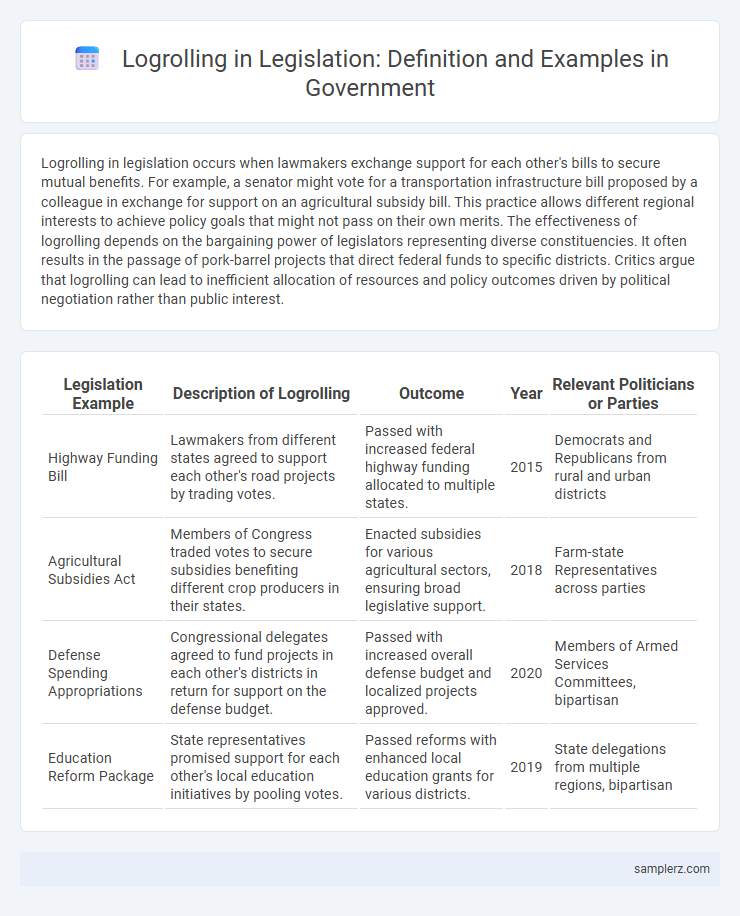Logrolling in legislation occurs when lawmakers exchange support for each other's bills to secure mutual benefits. For example, a senator might vote for a transportation infrastructure bill proposed by a colleague in exchange for support on an agricultural subsidy bill. This practice allows different regional interests to achieve policy goals that might not pass on their own merits. The effectiveness of logrolling depends on the bargaining power of legislators representing diverse constituencies. It often results in the passage of pork-barrel projects that direct federal funds to specific districts. Critics argue that logrolling can lead to inefficient allocation of resources and policy outcomes driven by political negotiation rather than public interest.
Table of Comparison
| Legislation Example | Description of Logrolling | Outcome | Year | Relevant Politicians or Parties |
|---|---|---|---|---|
| Highway Funding Bill | Lawmakers from different states agreed to support each other's road projects by trading votes. | Passed with increased federal highway funding allocated to multiple states. | 2015 | Democrats and Republicans from rural and urban districts |
| Agricultural Subsidies Act | Members of Congress traded votes to secure subsidies benefiting different crop producers in their states. | Enacted subsidies for various agricultural sectors, ensuring broad legislative support. | 2018 | Farm-state Representatives across parties |
| Defense Spending Appropriations | Congressional delegates agreed to fund projects in each other's districts in return for support on the defense budget. | Passed with increased overall defense budget and localized projects approved. | 2020 | Members of Armed Services Committees, bipartisan |
| Education Reform Package | State representatives promised support for each other's local education initiatives by pooling votes. | Passed reforms with enhanced local education grants for various districts. | 2019 | State delegations from multiple regions, bipartisan |
Understanding Logrolling: Definition and Principles
Logrolling in legislation refers to the practice where lawmakers trade support for each other's bills to secure mutual benefits, often seen in budget appropriations or tax provisions. This principle fosters coalition-building by enabling legislators to pass measures that might otherwise lack majority approval, leveraging negotiated agreements to advance diverse policy interests. Understanding logrolling is essential for grasping how legislative negotiations influence policy outcomes and resource allocation within government.
Historical Instances of Logrolling in Legislation
Historical instances of logrolling in legislation include the passage of the Smoot-Hawley Tariff Act of 1930, where lawmakers from different agricultural states exchanged support to secure tariff protections for their specific crops. Another notable example occurred during the 19th century Missouri Compromise, where Northern and Southern legislators agreed to admit Missouri as a slave state and Maine as a free state, balancing interests to maintain political stability. These episodes illustrate how reciprocal voting arrangements facilitated the passage of complex legislation in the U.S. Congress.
Notable Congressional Logrolling Deals
Notable congressional logrolling deals include the 1965 Highway Act, where lawmakers exchanged support for highway projects in their districts to secure overall funding approval. Another example is the 2009 Affordable Care Act, which involved vote-trading on specific provisions to gain bipartisan support. These deals typically involve mutually beneficial agreements that help pass significant legislation through strategic cooperation among legislators.
Logrolling in Budget Appropriations
Logrolling in budget appropriations occurs when legislators trade support for each other's funding projects to secure passage of mutually beneficial spending bills. This practice allows members of Congress to ensure funding for local projects by agreeing to fund others' initiatives, facilitating coalition-building in the appropriation process. Such exchanges often result in larger, omnibus spending bills that include diverse allocations catering to various constituencies.
Case Study: The Water Projects Act
The Water Projects Act exemplifies logrolling through lawmakers exchanging support for diverse infrastructure initiatives to ensure bill passage. Legislators from arid regions prioritized funding for reservoirs while counterparts from agricultural districts backed irrigation improvements. This reciprocal agreement facilitated the approval of comprehensive water management policies benefiting multiple constituencies.
The Role of Pork-Barrel Spending in Logrolling
Pork-barrel spending exemplifies logrolling by enabling legislators to exchange support for projects benefiting their constituencies, thereby securing mutual backing for bills. This practice often involves allocating government funds to localized projects, such as infrastructure or community facilities, to gain approval from multiple lawmakers. The strategic use of pork-barrel spending facilitates coalition-building, ensuring passage of legislation that might otherwise lack sufficient support.
Examples of Logrolling in Recent U.S. Legislation
Logrolling in recent U.S. legislation is exemplified by the Bipartisan Infrastructure Law of 2021, where legislators exchanged support for highway funding in one state with backing for transit projects in another. Similarly, the 2020 CARES Act featured logrolling through the inclusion of diverse provisions like small business loans and airline industry aid to secure broad congressional approval. These instances highlight how lawmakers strategically combine unrelated policy measures to pass complex bills.
Logrolling’s Impact on Policy Outcomes
Legislative logrolling allows lawmakers to exchange support for one another's bills, leading to the passage of policies that might not succeed individually. This practice often results in bundled legislation combining diverse, sometimes unrelated, measures that reflect concerted political compromises. The impact of logrolling on policy outcomes can include increased legislative productivity but may also compromise policy coherence and public interest priorities.
Ethical Considerations and Criticisms of Logrolling
Logrolling in legislation involves the exchange of votes among lawmakers to secure mutual support for each other's proposals, often leading to the passage of bills that may lack broad public interest. Ethical considerations arise as this practice may promote favoritism, undermine transparent policymaking, and prioritize special interests over constituents' welfare. Critics argue that logrolling can contribute to legislative gridlock, inflate budget expenditures with unrelated provisions, and erode public trust in government accountability.
Strategies to Limit Logrolling in Lawmaking
Strategies to limit logrolling in lawmaking include implementing stricter committee oversight to ensure transparency and accountability in bill amendments. Establishing clear criteria for bill content and requiring full disclosure of legislative agreements reduce the risk of unrelated vote trading. Additionally, promoting public participation and media scrutiny increases pressure on lawmakers to avoid logrolling practices.

example of logrolling in legislation Infographic
 samplerz.com
samplerz.com